Contacts:
Helen Cheng, NYSG’s Coastal Resilience Specialist, E: helen.cheng@cornell.edu, P: (718) 951-5415
Heather Sioux, Project Coordinator, The Resilient Schools Consortium (RiSC), National Wildlife Federation | NYC Eco-Schools, E: SiouxH@nwf.org, P: (845) 464-3443
New York, NY, June 1, 2018 – The first Resilient School Consortium (RiSC) Summit was held in south Brooklyn at City University of New York/Brooklyn College. At the summit, RiSC teams of students and their teachers presented displays about climate and extreme weather and how their schools are affected by climate change, and results of their school and school-community vulnerability assessments. The RiSC Summit gave students the opportunity to share their resilience plans with other RiSC teams and develop communities of practices around weather and climate resilience.
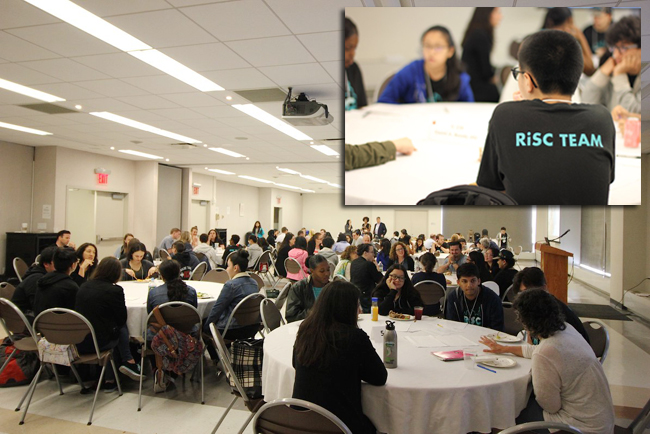
Funded through a 2016 National Oceanic and
Atmospheric Administration (NOAA) grant, the Resilient Schools
Consortium (RiSC) project prepares NYC public school students for
participation in climate resilience planning with NYC practitioners and
decision-makers. Credit: Heather Sioux.
The RiSC program seeks to educate students and provide funding for resiliency projects that they develop and to provide an opportunity for youth voices to be heard by climate resilience practitioners and decision-makers of New York City. The program is currently being implemented as both an after-school climate education program and as an in-class honors research program, designed to appreciate and involve perspective from young people on climate issues and provide resources for learning and building resiliency. The project builds on local resilience plans such as OneNYC, and fosters new partnerships among K-12 schools, informal education institutions, government and non-profit organizations working on resilience planning and implementation.
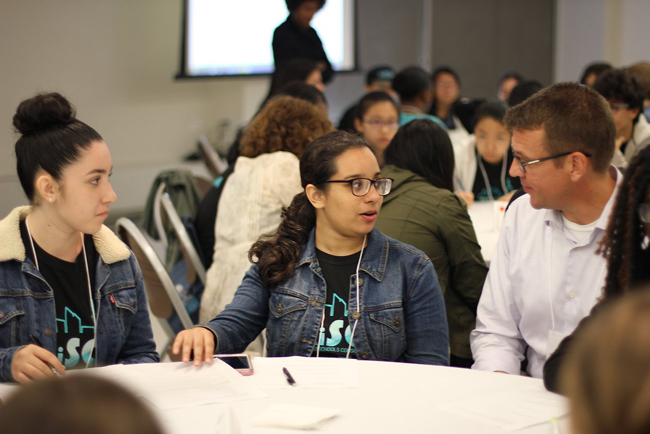
The National Wildlife Federation's Chris Hilke talks with students from John Dewey High School. RiSC's partners provide K-12 environmental literacy and climate resiliency plans for New York City’s schools, including south Brooklyn's John Dewey, that help students, faculty and districts prepare for a warming world. Credit: Heather Sioux, NWF.
Participants at the summit included RiSC students and teachers from David Boody Junior High School, Edward Murrow High School, Peter Rouget Junior High School, John Dewey High School, Rachel Carson High School for Coastal Studies, and Mark Twain Middle School. The summit also brought the conversation to an inter-generational level, inviting resilience professionals—scientists, government officials, and community from various city and state organizations and governmental agencies—to speak with students as equal stakeholders.

Students from each of the participating Brooklyn schools, including (at left) Peter Rouget Junior High School and David Boody Junior High School took part in the pre-summit RiSC Artifacts Showcase. Credits: Ryan Strother, Heather Sioux, NWF.
The Summit began with the RiSC Artifacts Showcase. RiSC teams displayed and shared the artifacts they have made throughout the year. For example, the team from Rachel Carson High School for Coastal Studies presented some of the damage that occurred during hurricane Sandy. The school was subject to nine feet of flooding, water damage to the entire first floor. The boiler room was particularly damaged—the school was required to use external boilers for over three years. As a result of Sandy, several improvements were made like raising the boilers twelve inches off of the floor, and drainage pumps were added to remove flood water.
Dr. Brett Branco, an Assistant Professor of Earth and Environmental Sciences at Brooklyn College and the project’s Principal Investigator kicked off the event. He led the resilience professionals in a promise to listen to the students and share their thoughts and ideas with them, and the students in their promise to speak with resilience professionals as equals.
Meredith McDermott, representing the Office of Sustainability at the NYC Department of Education (DOE) gave the opening remarks for the RiSC summit. She led the students in their pledge to bring their knowledge and ideas, and to talk to the RiSC professionals as partners and equals. Dana Kochnower from the New York City Mayor’s Office of Recovery and Resiliency (NYC ORR) then spoke about the importance of climate resilience and education in NYC schools. Both speakers expressed great enthusiasm for this project and the important role it plays for the future of the NYC DOE and the Mayor’s office.
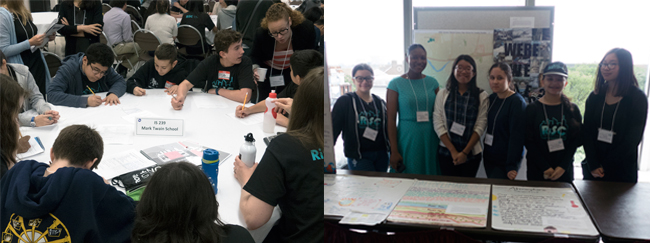
A half dozen Brooklyn schools, including Mark Twain Middle School (at left) and Rachel Carson High School for Coastal Studies (at right) are participating in the three-year RiSC project. Credit: Ryan Strother.
Students were then asked to share their findings from their vulnerability audits with the program participants. Earlier in the year, students conducted vulnerability audits and assessments of the climate related hazards their schools, neighborhoods and communities may or may not be properly prepared for. Student representatives addressed the group and identified the top three hazards of concern for their schools and surrounding community. Students, highly familiar with their school buildings, gave apt summaries of their school’s potential hazards and vulnerabilities.
A student representative from John Dewey High School remarked, “The only thing between our school and the ocean is Coney Island beach.” As such, John Dewey High School noted hurricanes as a top hazard. As part of their vulnerability assessment, they conducted research on the roof of the school to identify potential hazards.
“When we went up to the roof we didn’t find any hot tubs—that was a myth going around the school—but we did find the need for more infrastructure.”
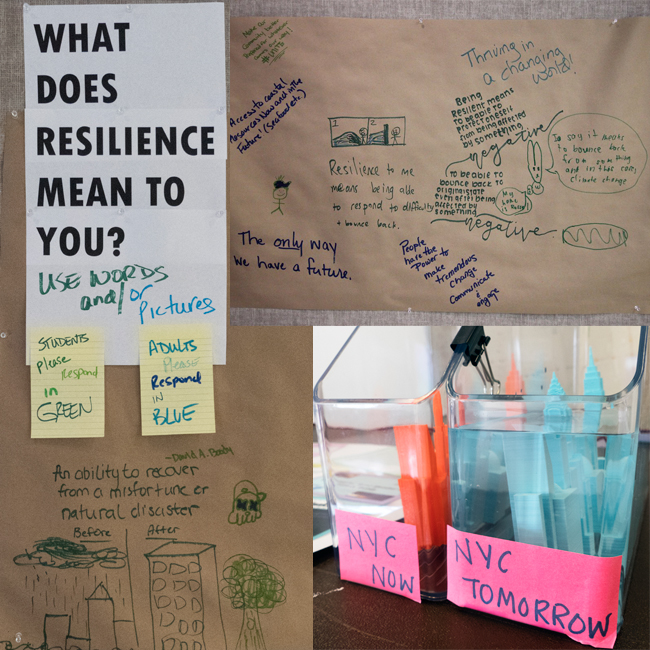
Examples of what resilience means to the students taking part in the RiSC project were in abundance at June's CUNY/Brooklyn College-based summit. Credits: Ryan Strother, Heather Sioux.
During lunch, resilience professionals joined the students for conversations about resiliency-related careers. Resiliency professionals introduced themselves and led conversations about the potential for careers in the climate and resiliency realm. Tables were assigned to resiliency professionals, where they gave brief introductions of themselves and their work in the climate resiliency field. Students shared perspective on the resiliency issues facing their neighborhoods, as well as the most rewarding parts of the RiSC program and their plans for the future.
Finally, time was allotted for a RiSC Project Design workshop. In collaboration with resilience professionals, students discussed improvement opportunities for their school based on their vulnerability audits.
Next year, these students will have the opportunity to design projects with funds provided to the teams. Utilizing their funds, research, and partnerships with resiliency professionals, schools will have the opportunity to build projects to make their schools and neighborhoods more resilient in the face of the increasing hazards of climate change.
Chris Hilke, Senior Manager of Climate Adaptation Programs at the National Wildlife Federation, said this during the final part of the day of open discussion: “The degree of climate literacy in this room is unbelievable. You guys know your stuff and it’s incredibly impressive. I sit through a lot of meetings with a lot of different people and the ideas that are coming out of those meetings don’t come close to some of the cool stuff I was hearing today so, it makes me feel really good about our future and where we’re headed.”
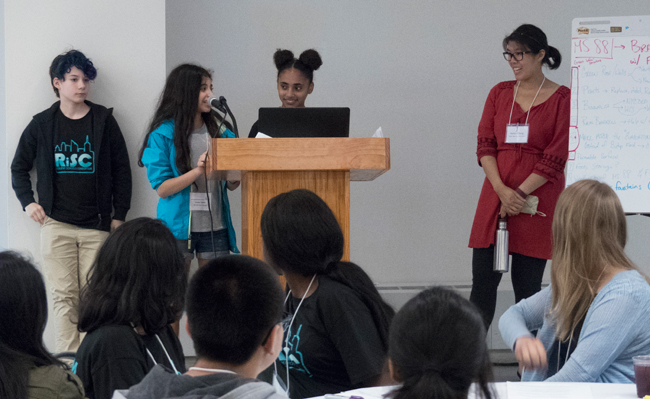
NYSG’s Coastal Resilience Specialist Helen Cheng (pictured at far right, in red) serves as one of the core team members of the RiSC project and helped design and plan for the RiSC Summit. Credit: Ryan Strother.
“The RiSC summit allows youth voices to be heard and inter-generational conversation between students and the team of resiliency professionals to happen," said NYSG's Coastal Resilience Specialist Helen Cheng. "They were impacted by Sandy, and they face a lifetime of impacts by changes in climate. There’s a need to develop environmental literacy and climate programs to prepare students for a changing world. Hearing their perspective is essential to take action and deal with the long-term consequences like rising sea levels and flooding. These students are the people who will ultimately take after us.”
The RiSC program is a partnership of Brooklyn College, the National Wildlife Federation’s Eco-Schools USA Program, the Science and Resilience Institute at Jamaica Bay, the Brooklyn Marine STEAM Education Alliance, and New York Sea Grant, and is funded by the National Oceanic and Atmospheric Administration Environmental Literacy Grant program.
More Info: New York Sea Grant
New York Sea Grant (NYSG), a cooperative program of Cornell University
and the State University of New York (SUNY), is one of 33 university-based
programs under the National Oceanic and Atmospheric Administration’s
National Sea Grant College Program.
Since 1971, NYSG has represented a statewide network of integrated
research, education and extension services promoting coastal community
economic vitality, environmental sustainability and citizen awareness
and understanding about the State’s marine and Great Lakes resources.
Through NYSG’s efforts, the combined talents of university scientists
and extension specialists help develop and transfer science-based
information to many coastal user groups—businesses and industries,
federal, state and local government decision-makers and agency managers,
educators, the media and the interested public.
The program maintains Great Lakes offices at Cornell University, SUNY
Buffalo, SUNY Oswego and the Wayne County Cooperative Extension office
in Newark. In the State's marine waters, NYSG has offices at Stony Brook
University in Long Island, Brooklyn College and Cornell Cooperative
Extension in NYC and Kingston in the Hudson Valley.
For updates on Sea Grant activities: www.nyseagrant.org has RSS, Facebook, Twitter, and YouTube links. NYSG offers a free e-list sign up via www.nyseagrant.org/nycoastlines for its flagship publication, NY Coastlines/Currents, which is published quarterly. Our program also produces an occasional e-newsletter,"NOAA Sea Grant's Social Media Review," via its blog, www.nyseagrant.org/blog.